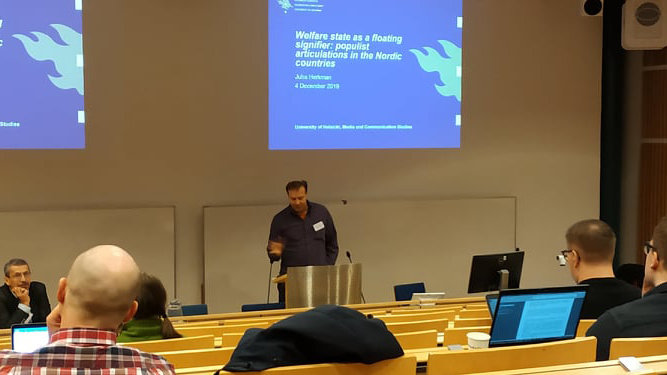How do populist parties in Finland and other Nordic countries relate to welfare state? Do they want to distance themselves from it or do they use it in their own political interests? Juha Herkman, Professor at Media and Communication Studies in University of Helsinki tried to answer these questions in his lecture.
As he explained, the first wave of populist parties in Nordic countries was a counter-reaction against the creation of welfare state, a strong social democracy. For instance, in Denmark or Norway anti-taxation movements emerged, while in Finland the Finnish Rural Party (1959-1995) became popular.
This party was based in an agrarian context but it had also anti-state elements, talking about the nostalgic 'heartland' and the 'happy history' of the nation-state – being more on the side of 'common sense individuals' than the strong state.

A moment of the symposium. Photo: Attila Kustán Magyari.
Second wave of populist parties
The second wave of populist parties emerged in the early 2000s and later, in this decade. This was based on nationalism and anti-immigration more, and since the welfare state’s ideology has become in a way “obvious” and hegemonic in these countries, populists couldn’t ignore or attack this idea.
They realized that if they want to gain popular support – such as the far-right populist True Finns in the past months –, an anti-welfare approach won’t help their case.
This means in practice that even though these parties promote private business and flexible labor market, they refer to these ideas as important aspects for maintaining welfare states. In a way -as Professor Herkman has stated– they look sometimes “more socialist” than their left-wing challengers.
This produces a so-called “welfare chauvinism”, combining the idea of welfare society and anti-immigrant sentiments, excluding non-Finnish people from this kind of system.
Today right-wing populist parties successfully created the illusion that if one want to vote for an alternative, a real radical political movement, then they are the best choice for that.
They managed to link the erosion of welfare state to economic globalization and immigration as its causes, while the left has hard time to make chains of equivalence like that.
Professor Herkman has warned the audience that although the idea of welfare state is strong in Nordic countries and Finland also, populist politics which demand radical change in status quo are endangering this.
How the True Finns use immigration
Marie Cazes, PhD candidate at Department of Social Science in the University of Jyväskylä outlined how anti-immigration rhetoric of the True Finns changed since 1995, the foundation of the far-right populist movement.
In the first year according to the party programme they accepted foreigners who are willing and can integrate and accept the Finnish system. Several years later, in 2003 they tweaked these statements, still emphasizing integration but also mentioning that they oppose certain cultural differences, such as child marriage or genital mutilation.
Immigration as topic still wasn’t important in these years, but we can detect that it became more critical, still not being radical. After 2007 it started to be more important as a topic, and more critical not only about Finland’s refugee policies but speaking up against the European Union’s also.
In 2011 we can see a crucial turning point: since that the phenomenon was treated as threat for the nation, and a separation emerged between “ordinary” and “bad” immigration.
In 2015 immigration’s effects were illustrated in the party programme with countries like the United Kingdom or Sweden, and with immigrants from Romania or Bulgaria.
Immigrants: uneducated and a source of problems
In 2019 the True Finns show immigration as a core issue in politics, as source of evil, immigrants as uneducated etc. – and, as we can see, it has more and more support, being currently the most popular party in Finland.
The Symposium on Populism was organized by The Institute for Advanced Social Research (IASR), a research collegium of Tampere University in 4-5 December, with lectures revolving around the phenomenon of populism. Professors, PhD candidates, MA students tackled relevant issues and also theoretical problems which try to grasp these political movements.
*Upfront picture by Kaihsu Tai.











